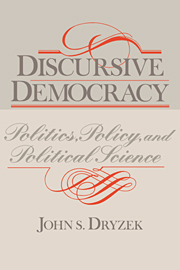11 - On Extending Democracy
from V - Conclusion
Published online by Cambridge University Press: 12 October 2018
Summary
The public face of politics as the twentieth century draws to a close affirms the triumph of at least two broad principles. The first is democracy, understood as the collective construction and application of political authority. The second is rationality, whether understood in terms of making choices for good cognitive reasons or as the capacity to resolve problems effectively through individual cogitation and social interaction. In practice, of course, these principles may be honored as much in their violation as in their observance. But at least on the plane of public justification, conservative suspicion of reason, fascist anti-intellectualism, and authoritarianism of the left and right have all been vanquished. Yet the intellectual demise of their erstwhile opposition has not left democracy and rationality secure. At best, they rest uneasily in tentative accommodation. At worst, there is outright conflict between these two principles.
This conflict arises in many different forms. Max Weber believed rationality entails bureaucratization, which strangles democracy along with the rest of the congenial aspects of human society. Even if Weber's scenario has proven overdrawn, it remains arguable that needs for effectiveness and coordination limit the possibilities for democratizing public organizations (Pollitt, 1986, pp. 180-1). Hannah Arendt, for her part, believes in the inevitability of conflict between the authentically “political” and the inescapably “social.” To Arendt, the latter, concerned as it is with mundane issues of problem solving, can only corrupt and destroy authentic politics. To prevent this corruption, she endorses the classic (but unattainable) separation of politics and administration. Postmodernists and deconstructionists take a critique of rationality far beyond Weber and Arendt. They argue that rationality can only constrain and repress human spontaneity and diversity. But beyond their condemnations of hierarchy, it is not clear that they endorse any particular kind of politics, let alone democracy.
In all of these accounts, and many others, it is the authority claimed by expertise that leads rationality to confront, corrupt, and perhaps even destroy democracy. I have tried to show that this claim is unfounded and that the rational activities in which “experts” are engaged point to democracy, not hierarchy. I have argued for the democratization of expertise in politics, public polity, and political science. But this reconciliation of democracy and rationality only makes sense if it proceeds under the banner of communicative rationality.
- Type
- Chapter
- Information
- Discursive DemocracyPolitics, Policy, and Political Science, pp. 217 - 221Publisher: Cambridge University PressPrint publication year: 1990



